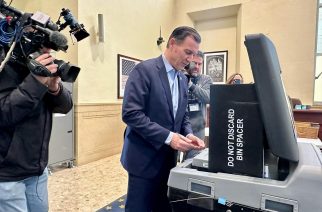
Stores risk losing lottery and liquor licenses if they are caught selling K2 and other forms of synthetic ‘marijuana’
Following a recent incident in Brooklyn where more than 30 people were sickened after ingesting synthetic marijuana, Gov. Andrew Cuomo has ordered an aggressive statewide crackdown on the sale of K2 and other forms of fake pot.
Often sold in colorful packaging featuring cartoon characters, it looks so harmless that the governor compared the packaging to that of “children’s candy.”
K2 manufacturers claim that it mimics the effects of THC, the active ingredient in marijuana. Instead of the mild effects of THC that users are expecting when they light up, they can instead experience hallucinations, seizures, kidney failure, and in extreme cases, death. Often sold in bodegas and delis in New York City and other urban centers across the state, K2 is popular because of the false reputation it has for being a synthetic marijuana; some packages even brandish the names of well-known marijuana strains.
However, K2 is nothing like marijuana in regards to both psychoactive effects and composition. It is manufactured by spraying various chemicals on otherwise harmless herbs. The potency and effects of K2 can vary from package to package, and due to its inconsistent nature, one can never be sure how little or how much it takes to cause an overdose.
The chair of the Assembly Committee on Health, Richard Gottfried, says labeling K2 as a marijuana substitute is “particularly offensive” and “wrong.” It tricks people into thinking that they will be consuming something relatively harmless, and not a cocktail of chemicals, he said.
“If people think K2 is marijuana they will keep using it because they know marijuana won’t kill them.” Gottfried went on to compare K2 to other harmful drugs like crystal meth and heroin.
“K2 has no relationship to marijuana” said Gottfried “[It’s] nowhere near the same ballpark.” His constituents must agree because New York has recently added K2 to the list of controlled substances making it illegal, something that the federal government has yet to do.
Despite state officials’ efforts, K2 consumption continues to rise. There have been 6,000 K2 related emergency room visits since 2015 in New York City, and earlier this month, more than 30 people were hospitalized in a single day in Brooklyn after a neighborhood store sold them a bad batch.
That store, known for selling the dangerous drug, has been shut down multiple times but continues to re-open, each time with more K2 in stock. It has mainly been a problem in the metropolitan area, but earlier this week a store-owner was charged with the illegal sale of K2 in Rochester. The police seized more than 150 packets of the illicit substance as part of the statewide crackdown.
Samples of the seized products in Rochester were analyzed by the Department of Health’s Wadsworth Center laboratory in Albany. XLR-11, a compound found in the seized packages, is among the substances added by DOH to the banned substances list in 2015.
The drugs are often marketed in corner stores as incense, herbal mixtures, or potpourri in order to mask their true purpose. Brand names for substances include Spice, K2, Green Giant, Smacked, Wicked X, AK-47, Geeked Up, Ninja, Caution, Red Giant, and Keisha Kole. The packets that tested positive in Rochester are known as “Scooby Snax.”
In an effort to prevent cases like these from persisting, Governor Cuomo ordered the State Liquor Authority, and the New York State Gaming Commission to increase their efforts to revoke the liquor and lottery licenses of store owners found to be selling K2 and other brands of fake marijuana. “If a store owner knowingly sells this drug, they should be out of business, period,” Cuomo said.
Gottfried says stopping this problem now is crucial, before it spreads even further across the state, but he does not believe that law enforcement alone is not the solution. “We’ve been arresting people for a century and the problem hasn’t been solved,” Gottfried said. “Education and treatment are the most productive answer.”
The penalty for the sale of K2 in New York state is up to $500 in fines and 15 days in jail. Distributors can also be held accountable in civil cases and fined up to $2000 per violation.









